| dealing with malaria | Malaria is a serious issue
for anyone traveling
in sub-Saharan Africa, even more so for cyclists who will spend
considerable time in villages and away from major medical centers. Your
best defense is a good mosquito net, liberal use of repellent and
covering exposed areas as soon as the sun starts going down. You'll
also probably want to take prophylactics. These are drugs that guard
you against the disease, but are never 100% effective. New, resistant
strains of malaria are cropping up all the time so you have to stay
abreast of the situation. 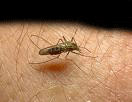 We're
not medical experts, but we have decided to share what we've learned
about malaria in hope of leading you in the right direction. Be sure to
contact your local Tropical Disease Center to get advice from a
specialist. We're
not medical experts, but we have decided to share what we've learned
about malaria in hope of leading you in the right direction. Be sure to
contact your local Tropical Disease Center to get advice from a
specialist.Some medical professionals may tell you that you'll build up a resistance to malaria after having spent an extended period of time in a malaria zone. As far as we can tell this is absolute rubbish, because locals from Senegal to Malawi all complain of being effected by the sometimes deadly illness. Lariam, a once popular anti-malarial, has a reputation for causing serious side-effects such as nightmares, paranoia, and in extreme cases, irreversible mental-illness. We decided those side-effects weren't worth the risk. Chloroquine alone is another option, but only in regions categorized by the WHO as zone 1 (low resistance, eg Morocco, Egypt). In zone 2 (medium resistance, eg Mauritania and northern Senegal) one can take a combination of chlorquine plus proguanil, which is what we did. In zone three regions (high resistance, all other countries up to Zambia) we took a daily 100mg dose of doxycycline, which is actually an anti-biotic. One major side-effect of doxycycline is that it can make you more sensitive to sun. Fortunately, we didn't have this problem. Anti-malarials can be very expensive when purchased in Europe or North America. We bought all medicines in Africa, where they are readily available and cost a fraction of what you pay in the West. Although there have been recent scares about fake drugs flooding the markets in Africa, most reputable pharmacies will stock drugs imported from India (one of the world's largest producers of pharmaceuticals) which are often manufactured in cooperation with a reputable Western pharmaceutical company. It's not always easy to know if you've got malaria, especially if you're taking prophylactics because these drugs may mask symptoms. Here is a list of symptoms associated with malaria:
Malaria symptoms will occur at least 7 to 9 days after being bitten by an
infected mosquito. We both came down with a mild form of malaria twice. It was not the crisis we had imagined. Certainly no need to check and see if the travel insurance covers medical evacuation. Just a heavy fatigue, listlessness and high fever. Just a couple of days after beginning the treatment we felt better and were able to get back on the bikes. We were lucky, but malaria  can be
fatal so do take any symptoms seriously. can be
fatal so do take any symptoms seriously. Check out the Center for Disease Control for country-by-country specific health information. |
| safe drinking water | 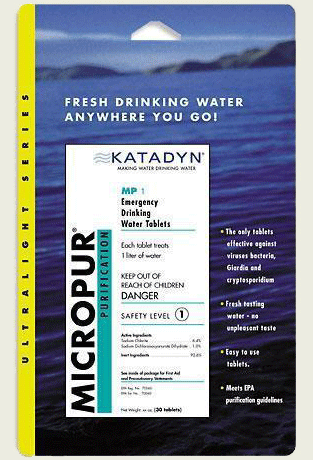 Unless
you want to find yourself squatting in a ditch doubled over with a bad
case of the runs, it's important that you find sources of safe drinking
water during your cycling tour. Unless
you want to find yourself squatting in a ditch doubled over with a bad
case of the runs, it's important that you find sources of safe drinking
water during your cycling tour.Even in very remote parts of the world, you can almost always buy bottled water and coca-cola. Some enterprising shopkeeper just sits and waits for a group of aid-workers or rich Western tourists in a white Land Cruiser to pull up and buy these precious fluids. Being on a budget and environmentally conscious, most cyclists will not want to depend on bottled water. They will want to drink the water locals drink, either directly or after first treating or filtering the water. Think carefully before taking that first refreshing gulp. Drinking unsafe water is the most common cause of illness amongst travelers. Water-borne illnesses have a variety of causes. The most common of which is bacteria, such as E. coli, cholera and salmonella. Illness can also be caused by protozoa (including giardia and cryptosporidium), viruses (like hepatitis A, polio and rotavirus) and chemical pollutants. Sounds scary, doesn't it? What's more, you can become ill simply because the pathogens in the water are foreign to your immune systems. Locals have adapted to the water supply and can drink it without problems, but you'll get sick by drinking the same water. If you want to keep the time you spend moaning and groaning in the tent to a minimum, you'll have to be sure the water you drink is safe. We hardly ever bought bottled drinking water while traveling in Africa. Normally we got our water from village wells that are meant to provide potable water for the local population--these have usually been constructed with the help of an NGO. This water should be safe, but when we had our doubts we also purified the water using Micro-Pur tablets or Micro-pur drops. A small bottle of drops can be used to purify 1000 liters of water. Micro-pur is effective against cryptosporidium, giardia, bacteria and viruses. There's no chlorine odor or taste and the required wait time is only 15 minutes for bacteria and viruses, and a 30 minute to 4-hour wait time for cysts like Giardia and Cryptosporidia (depends on water quality). The longer we travelled, the less we purified, believing (perhaps wrongly) that our bodies had become used to different types of water. Many cyclists carry a water filter. After taking into account extra weight and maintenance required we decided not to pack a filter. There are many different brands of filters on the market, so shop around before buying. 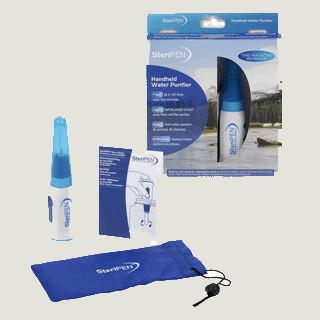 An exciting
and innovative new water purification system is the SteriPen.
We've seen Peace Corps workers using them and they say
SteriPen makes water safe in minutes with minimal effort. An exciting
and innovative new water purification system is the SteriPen.
We've seen Peace Corps workers using them and they say
SteriPen makes water safe in minutes with minimal effort. One last tip: if you're cycling in Africa, be sure to fill up on water whenever you have the chance. It's no fun being caught out  when
there's a water cut (very frequent) or the
pump in the next village is locked or broken. when
there's a water cut (very frequent) or the
pump in the next village is locked or broken. |
| vaccinations | It
is imperative that you plan
ahead and start getting vaccinations well before your tour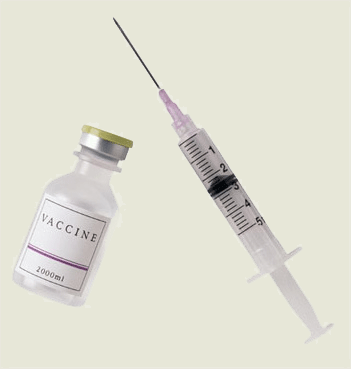 starting
date. Some vaccinations, such as rabies, must be given in a
series and you normally will have to make more than one trip to the
doctor to get all of your vaccinations taken care of.
Recommended
vaccinations for Africa include hepatitis B, diphtheria, tetanus,
measles, mumps, rubella and polio, hepatitis A, meningococcal
meningitis,rabies and typhoid. Be
sure to have your vaccination book filled in correctly as at some
border crossings you will be required to present it. A yellow
fever certificate is also a requirement in starting
date. Some vaccinations, such as rabies, must be given in a
series and you normally will have to make more than one trip to the
doctor to get all of your vaccinations taken care of.
Recommended
vaccinations for Africa include hepatitis B, diphtheria, tetanus,
measles, mumps, rubella and polio, hepatitis A, meningococcal
meningitis,rabies and typhoid. Be
sure to have your vaccination book filled in correctly as at some
border crossings you will be required to present it. A yellow
fever certificate is also a requirement in  many
African countries.
Check here for Recommended vaccinations by Country. many
African countries.
Check here for Recommended vaccinations by Country. |
| healthcare in Africa | 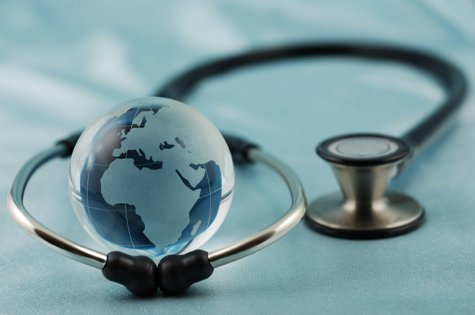 Going
to a hospital in Africa probably seems like your worst nightmare, and
it could be. Standards vary widely and you can never quite be
sure who claims to be a doctor. That said, we had mostly
positive
experiences with healthcare workers in Africa. We
both
survived two bouts of malaria, Eric recovered from a broken
collarbone in Cameroon and I had my teeth fixed in Uganda.
Mission hospitals are probably still your best bet for decent
health care. In most large cities you will find private
clinics
used to dealing with international patients. Going
to a hospital in Africa probably seems like your worst nightmare, and
it could be. Standards vary widely and you can never quite be
sure who claims to be a doctor. That said, we had mostly
positive
experiences with healthcare workers in Africa. We
both
survived two bouts of malaria, Eric recovered from a broken
collarbone in Cameroon and I had my teeth fixed in Uganda.
Mission hospitals are probably still your best bet for decent
health care. In most large cities you will find private
clinics
used to dealing with international patients. In more remote areas don't count on being able to get good medical treatment and be sure to have a well-stocked pharmacy with you. The most important item in your pharmacy should be an emergency dose of medicine to combat malaria. If in doubt, take this medicine. If not it could be too late. Even well-educated foreigners who 'should know better' die each year of malaria. We've heard plenty of horror stories about ex-pats who weren't feeling well one day  and were
dead two days later. and were
dead two days later. |
| sun exposure | The
sun can be incredibly strong in Africa, especially around the equator
and in the desert. It is best to bring a good supply of
sunscreen
from home as finding these products in many parts of Africa can be
difficult. We recommend sunblock 50, 30 at the very least.
Lips can be very sensitive so you may want to consider but a
total block product like those designed for alpinists. I
suffered
from lip sunburn and believe me it's PAINFUL. So painful I
wasn't
able to sleep at night without strong painkillers--the kind you only
get under prescription in the developed world but are available
over-the-counter all over Africa. You may want to wear a light long-sleeved cotton shirt to protect your arms and be sure to have a good wide-brimmed hat to keep the sun out of your face--make sure it's not one that will fly off as you ride. For lip protection I sometimes wear a simple mask over my nose and lips. Basically just a piece of elastic attached to a triangle of fabric. Wearing a mask was uncomfortable at first but certainly the benefits far out-weighed the inconvenience.  |
| preventing saddle sores | If you've ever had saddle sores, you know they're painful.
Saddle sores are common in the groin, upper leg and butt and are
caused by prolonged and excessive weight on one part of the body.
Here's what you can do to prevent them:
.  |
| choosing a travel insurance | Tempting though it might be, opting
out of travel insurance is not recommended. If you're really on a
tight budget it's better to cut corners elsewhere or shorten your tour. If you have a serious illness and need to be repatriated and are without travel insurance 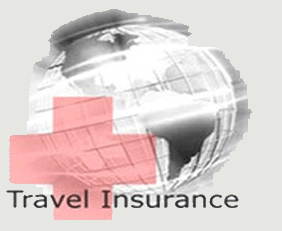 coverage, it is unlikely that your embassy or regular health insurance
will cover the costs. Although basic healthcare is reasonably
priced in most of the developing world,
serious illness will need to be treated in a regional health care
center such as Johannesburg or Nairobi if you're traveling in Africa or
Bangkok if you're traveling in Asia. This can be very
expensive. If you plan on cycling through Europe, or North
America it would be very unwise to leave home without coverage.
coverage, it is unlikely that your embassy or regular health insurance
will cover the costs. Although basic healthcare is reasonably
priced in most of the developing world,
serious illness will need to be treated in a regional health care
center such as Johannesburg or Nairobi if you're traveling in Africa or
Bangkok if you're traveling in Asia. This can be very
expensive. If you plan on cycling through Europe, or North
America it would be very unwise to leave home without coverage.There are lots of travel insurance companies out there so it's not always easy to choose. Here are some things to keep in mind: Typically you can choose from several different maximum benefit levels for medical treatment. In theory, the lower the maximum benefit the cheaper the insurance. If you fall ill or are in an accident while traveling, the insurance company will only be liable for paying medical claims up to this maximum benefit level. If you're traveling in the US in particular, always make sure to purchase enough coverage for the worst case scenario. After choosing a medical maximum limit, you will need to decide on a deductible. Deductibles can be anything from $0 to $5,000 or higher. Remember that you will be responsible for meeting this selected deductible amount. The insurance company will only pay claims after the deductible has been met. If you have large cash reserves, you will feel comfortable with a large deductible. For those without a financial cushion, zero deductible is probably best. Also check to make sure which countries the policy will cover. Often you will not be covered in your home country. Many insurance plans cover travel worldwide except in the USA (due to the high costs of medical care). Another thing to think about is the renewal policies of the insurance company. If you decide to extend your trip, some insurance companies may allow you to extend online. Others will make you take out a new policy at different rates. When a travel plan is renewable, the deductible will not typically be reset for the extended period of coverage. We have been using World Nomads since 2006 and can highly recommend them. We can make our claims on-line and extend the policy indefinitely. It's a very flexible policy which suits are needs as adventure travelers.  |


